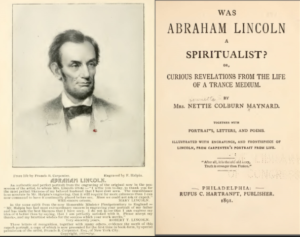 Speaker: Cheryl Spinner, Ph. D. Duke University
Speaker: Cheryl Spinner, Ph. D. Duke University
Title: Intuitive Historiography in the Archive
Date: April 6, 2017 – Bunge Room, 4207 Helen C. White Hall

On Thursday last, Cheryl Spinner, finalist and honorable mention for the James P. Danky Fellowship, brought both levity and gravity to her presentation about researching nineteenth- and twentieth-century spiritualists in the archives of the Wisconsin State Historical Society. With the information she found, Spinner was able to enlarge the geography of spiritualism, a subject that has traditionally been studied from its epicenter – Rochester, New York and other East Coast circles. Unbeknownst to many of us in the audience, Madison, WI also had an active spiritualist community in the mid to late 1800s.
The first part of Spinner’s presentation centered around a question raised by Jay Monaghan in his 1891 article “Was Abraham Lincoln Really a Spiritualist? Spinner used the Lincoln scenario to navigate the debate from Lincoln’s spiritualism to the gendered domain of women spiritualists significant in Lincoln’s circles. Through this close analysis, Spinner presented primary sources of photographs taken with spirits hovering in the background, as well as letters written from spirits (in backward script) to Lincoln and others. Discarding this type of historical evidence as valueless and insubstantial, Spinner argues, simultaneously discards evidence of women inserting themselves not only in the spiritual realm, but also in the political realms of society.
 Traditional historiography draws attention to the gendered nature of spiritualism and uses it as a methodological magic mirror that helps to better understand non-normative stories. While men like Monaghan sought to debunk spiritualists and spiritualism, Spinner prefers to let the unbelievable live, allowing the impossible to breathe and maintain dignity.
Traditional historiography draws attention to the gendered nature of spiritualism and uses it as a methodological magic mirror that helps to better understand non-normative stories. While men like Monaghan sought to debunk spiritualists and spiritualism, Spinner prefers to let the unbelievable live, allowing the impossible to breathe and maintain dignity.  In so doing women like Nettie Colburn Maynard (1841-1892) come to life. Maynard, whose book uses the same title as Monaghan’s article, was a medium herself and claimed that spirits instructed her to tell Lincoln to issue the emancipation proclamation. Whether this is true or not, is not the question. What is more interesting is that through her spiritualist practice, Maynard is positioning herself as influential in the highest political circles. Likewise with Mary Todd Lincoln (1818-1882), Abraham Lincoln’s wife. Mary was involuntarily institutionalized for psychiatric disease a decade after Lincoln’s death, but her spiritualist photographs suggest a woman clearly acting to maintain her ties to Lincoln and fashion an image around his fame.
In so doing women like Nettie Colburn Maynard (1841-1892) come to life. Maynard, whose book uses the same title as Monaghan’s article, was a medium herself and claimed that spirits instructed her to tell Lincoln to issue the emancipation proclamation. Whether this is true or not, is not the question. What is more interesting is that through her spiritualist practice, Maynard is positioning herself as influential in the highest political circles. Likewise with Mary Todd Lincoln (1818-1882), Abraham Lincoln’s wife. Mary was involuntarily institutionalized for psychiatric disease a decade after Lincoln’s death, but her spiritualist photographs suggest a woman clearly acting to maintain her ties to Lincoln and fashion an image around his fame.
What Spinner found in the Wisconsin State Historical Society archives attests to similar activities in Wisconsin spiritualist circles. A particular set of letters written by Lyman C. Draper, first director of the Wisconsin State Historical Society, gave detailed descriptions of seances that he attended in person. On more than one occasion spirits that appeared at these seances suggested he become a medium himself. He was not so inclined, but wrote that “the spirit says it would be useful .”
This original research carried out by Spinner sheds light on how intuition can be used in the archives to move beyond one’s disbelief in spiritualism in order to uncover how those involved, mostly women, were able to use the practice to bypass traditionally-gendered political barriers of the time.